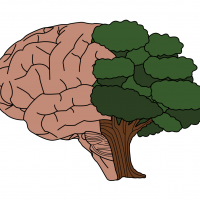What is aphasia?
Aphasia is a language disorder that currently affects over 2 million Americans (Simmons-Mackie, 2018), with approximately 180,000 new cases each year (American Speech Language Hearing Association). Aphasia can affect all different aspects of language, including speaking, understanding, reading, and writing. Aphasia occurs when there is damage to the parts of the brain that support language.
What causes aphasia?
Aphasia is an acquired language disorder. That means that there is an acquired condition that causes aphasia. While stroke is the most common cause of aphasia, it can be caused by any acquired brain injury—including tumors, traumatic brain injury, and the degeneration of brain tissue—that affects the language centers of the brain.
When aphasia is caused by a stroke or other brain injury that involves a recovery process, language skill can recover. The amount of recovery depends on a variety of factors, including the severity of the injury and the amount of language therapy. In general, aphasia is a lifelong condition.
When aphasia is caused by brain degeneration, such as in primary progressive aphasia, language function will decline over the course of the disease progression. However, language therapy can help individuals maintain function for as long as possible.
What is it like to have aphasia?
The most prominent, persistent, and frustrating language difficulty in aphasia is anomia, or difficulty with word retrieval. Most of us have experienced a “tip-of-the-tongue” state when a word temporarily escapes us, such as trying to think of the name of a famous person. Imagine this happening for the majority of the words you want to say! Other language problems include having difficulty understanding conversations and having difficulty forming sentences. Think of how frustrating it must be to have a message you want to convey, but simply cannot find the words or construct the sentences you need to say it.
Importantly, aphasia is not a deficit in intelligence!
Aphasia can be very isolating because the difficulties with communication affect social relationships, from store clerks to best friends. Aphasia often also affects one’s identity or sense of self because difficulties with communication can affect so many aspects of life. Aphasia can also cause social anxiety and depression. It is important for someone with aphasia to have access to counseling services, if needed.
What can I do to help someone with aphasia?
The most important thing you can do to support a friend or family member with aphasia is to acknowledge their competence. This means letting them know that even though they are having difficulty communicating, you know that they know what they want to say. When someone has difficulty understanding conversation or speaking, it might be easy to leave them out of the conversation or talk to them as if they are children or have intellectual difficulties. Try not to fall into this trap. Speak directly to the person with aphasia. Speak in short sentences and use common words. Use gestures and pictures and write down important words or phrases to support understanding. Allow the person with aphasia time to respond. Do not try to guess what they’re saying unless they ask for help. Encourage the person with aphasia to use gestures, pictures, and writing to help you understand what they’re saying.
